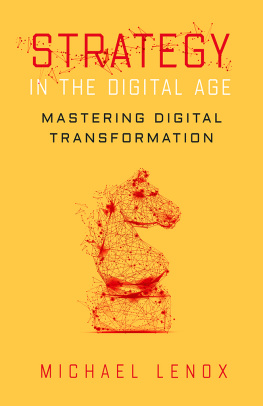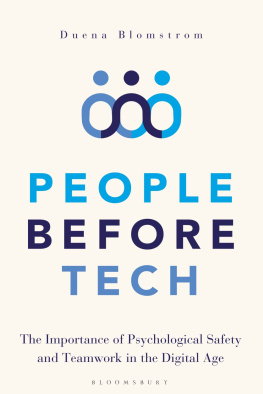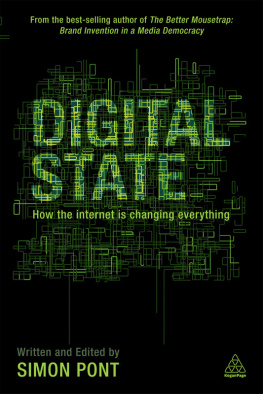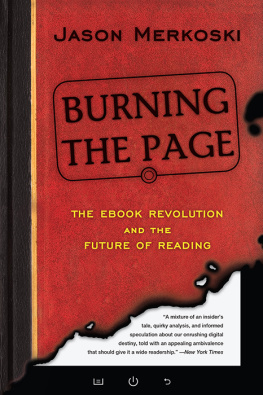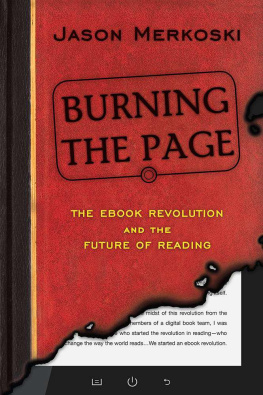Finding the Future of Digital Book Publishing
Interviews With 19 Innovative Ebook Business Leaders
EDITED BY JEREMY GREENFIELD

F+W Media, Inc.
Digital Book World
Digital Book World
GARY LYNCH
Group Publisher
JEREMY GREENFIELD
Editorial Director
DEANNA UTROSKE
Content Producer
Design
BEN KING
Cover Design
WENDY DUNNING
Managing Designer
GREGORY KRUEGER
Corporate Director of Digital Production/Prepress
Production
INDIA AMOS
Ebook Developer
DAN KERN
Director, Search Engine Optimization
Advertising / Business / Development / Marketing
RAYMOND KYLE
Business Development Manager
AMANDA MALEK
Director, Online Product Development
MEAGHAN FINNERTY
SAMANTHA STANDFORD
JENNIFER AFFRUNTI
Conference Sponsorship Sales Representatives
MEGAN PERRITT
Digital Merchandising Marketer
F+W Media Inc.
VICKY DOMINGUEZ
Administrative Associate
ALISON PRYOR
Ebook Sales Manager
DAVID BRIERLEY
Digital Asset Coordinator
MATTHEW LEBLANC
Director of Digital WorkflowEbooks
MEGAN PERRITT
Digital Merchandising Marketer
SUZANNE LUCAS
Manager, Contracts & Royalties Group
Executive Committee
DAVID NUSSBAUM
Chairman and Chief Executive Officer
JIM OGLE
Chief Operations Officer and Chief Financial Officer
SARA DOMVILLE
Book Division President
DAVID BLANSFIELD
Magazine Division President
CHAD PHELPS
Chief Digital Officer
PHIL GRAHAM
Senior Vice President, Operations
AMY MEYER
Vice President, Human Resources & Talent Management
STACIE BERGER
Communications Director
LUCAS HILBERT
Vice President, eCommerce
KATE RADOS
Group Digital Marketing Director
Editors Introduction
by Jeremy Greenfield
DECEMBER 2012
When I first joined Digital Book World in Oct. 2011, I knew very little about the book publishing industry and almost nothing about ebooks. In preparation for the job, I bought my first e-readera Kindle 3G e-ink reader with a keyboard and adsand loaded it with books about the publishing industry, including the excellent Book Business: Publishing Past, Present, and Future by Jason Epstein (W.W. Norton & Co.).
As good as Epsteins book is, it didnt give me the knowledge I would need to begin to do my job, which is to cover the ebook industry and provide its people with the information they need to run their businesses better and advance in their careers. It did teach me two important things, though:
- The business is ever-changing the future is nearly impossible to predict. Book Business is nearly a decade old and at the time one of the emerging technologies in the industry was the Espresso Machine, which, despite its misleading name, does not make coffee but prints booksa print-on-demand machine for bookshops. Epstein predicted that this machine would take the industry by storm and change the dynamics of back-list sales and distribution, among other things (needless to say, the Kindle was the device that would eventually do those things and not the Espresso Machine).
- The book business is all about the people. From colorful tales about authors like W.H. Auden and Ted Geisel dragging themselves into the Random House offices in the old Villard mansion at Madison and 50th St. in New York to stories of great mergers between old publishing houses, people are at the center. Its true in every industry that a companys best assets walk out through the front door every day at 5:00 PM; its much more true in media businesses, for the products we create are a manifestation of our personalities.
While I knew that I knew nothing on the day that I started, Epstein gave me a clue to learn what I would need to know. From day one, I started talking to people. I scheduled as many conversations as I couldover coffee, usually, but many on the phone, too. I spoke with heads of digital at major publishing houses as well as independent ebook production geeks. I met with agents, self-published authors, publishing consultants and book marketers. I talked with folks at Amazon and Kobo, Ingram and Constellation, Aptara and Innodata. I spent a lot of time talking to my colleagues at F+W Media, who live and breathe the industry.
I asked them about their careers, the industry, the companies at which they worked. I wanted to know what they knew about what was going on in publishing as well as what they didnt know so I could go and find it out for them. And I told them my storieswhere I came from, what I liked to read, what I hoped for Digital Book World and myself.
A small fraction of these conversations made it onto DigitalBookWorld.com and into this ebook. The character or residue of many of them have turned Digital Book World into what it is today.
As I said earlier, in the media business, the products we produce are a manifestation of our personalities. I couldnt have chosen a better way to learn about the industry. Unfortunately, almost everything I learned became irrelevant the minute I learned it. Its a sensation many people in book publishing must be feeling these days. The industry is changing so quickly that one has to be a voracious consumer of information just to keep up.
Herein lies the reason I think this book is important. Technologies and business conditions change and industries will change with them, but when it comes to executing that change, its all about the people. In many of the interviews in this book, youll hear executives talking about training their people to do new things and hiring new kinds of people. Youll see that some of the subjects are c-level executives at major publishers and come from outside the industrya deliberate move by management to change the direction of an organization. And youll learn about the career histories of many successful business leaders, seeing how they overcame challenges and capitalized on opportunities.
If you want to know where the publishing industry is going, you only need look to the people guiding it. Just ask them whats coming and theyll tell you.
The Importance of People and Recruiting in the Digital Book Era
The Future of Publishing
by Thad McIlroy
NOVEMBER 26, 2012
This is the first and only published volume that asks executives at the major U.S. publishers how they manage their businesses in an age when their business model is challenged by a format that doesnt exist in the physical space, usually sells for much less than print, and has an audience that shifts and reforms with every new industry survey and with the release of each new chunk of irresistible shiny hardware.
From Callaway to Wiley, publishers new and old are well-represented. Theres also one large self-publishing group, Smashwords (represented by CEO Mark Coker) and one etailer, Kobo, represented by EVP Michael Tamblyn.
The interviewer, DBW editorial director Jeremy Greenfield, gives each executive the opportunity to provide background on their career and the scope of their company. He then explores with each the topics that matter: staffing, pricing, digital formats, marketing, distribution, discoverability and the future of the industry.


